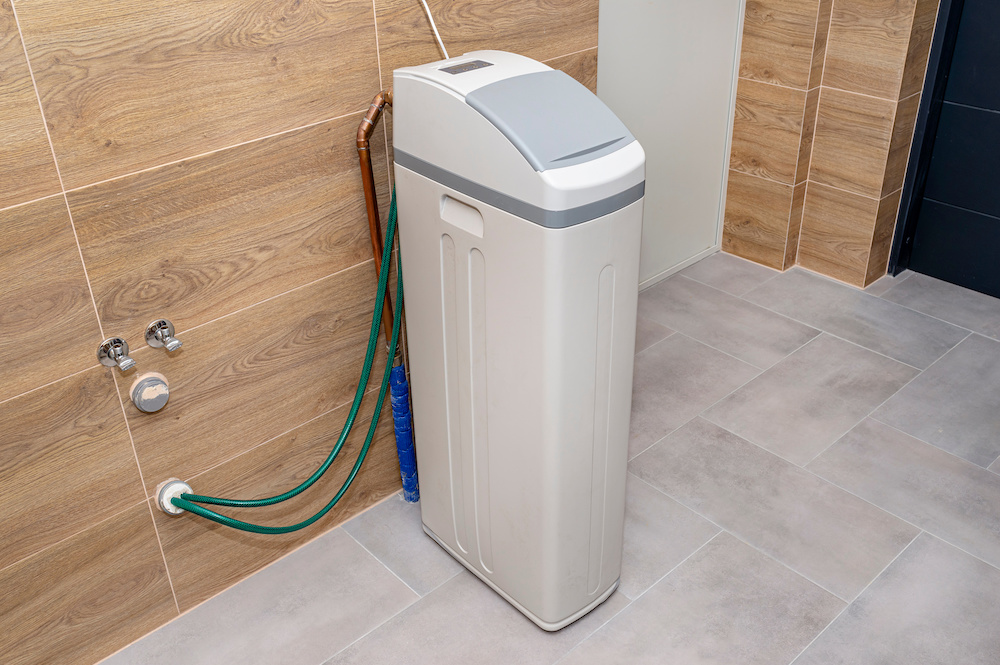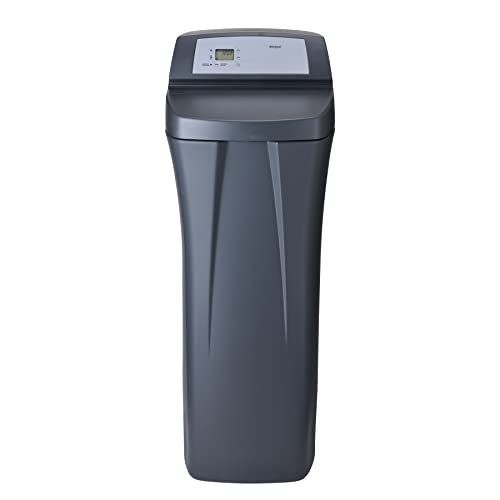Asking how often should a water softener regenerate is key to maintaining your water treatment system.
The regeneration process is your appliance’s maintenance and helps ensure it operates efficiently over time.
The more efficient the water softener regeneration process is, the longer you’ll have soft water in your home.
How Does Water Softener Regeneration Work?
The primary purpose of a water softener is to remove excess minerals from your bathing and drinking water.
It helps provide healthier water with fewer minerals and safer water for washing clothes and dishes.
These appliances work via a process known as ion exchange.
When hard water is brought into your water softener, it passes through resin beads packed onto a resin bed.
These beads capture calcium and magnesium ions, the elements responsible for creating hard water.
As your water softener runs, it continues to capture these ions and create buildup, which reduces the softener’s ability to remove hardness over time.
This is when water softener regeneration comes into play.
In water softeners, brine water removes built-up mineral deposits on the resin beads.
When a water softener regenerates, this salt cycles through the system, eliminating buildup and revitalizing the softener.
How Often Should a Water Softener Regenerate?
Regular water softener regeneration is best, as this helps maintain the unit and keep it in optimal working order.
The more regularly your water softener regenerates, the more active your resin bed becomes.
Over time, you will notice this helps remove even more minerals from the water, making it more pleasant to drink and use over the years.
That said, most water softeners regenerate at least every two to three days, while others take one to two weeks.
This would depend on how many gallons of water you use weekly.
What Affects Water Softener Regeneration?
As mentioned, several factors can affect a water softener regeneration process. Let’s take a look at a few of the most common reasons.
Water Hardness
The hardness of the water has a lot to do with your water softener regenerating.
Remember, this process occurs when the system has too many minerals collected on the resin bed.
As such, the harder the water, the more often the softener regenerates.
Another vital thing to note is the amount of iron in your water supply.
Chemical deterioration due to iron is one of the largest issues that modern water softeners can experience.
This is why there are iron-specific cleaners you can buy from home improvement stores.
Like other minerals, the more iron in the water, the more often the unit regenerates regularly.
Household Water Usage
Another factor that affects how often your water softener recharges is how much water your household consumes.
Households that use more water will experience considerably more regeneration than those that consume less.
When installing your water softener, the water treatment professional will address the settings to accommodate your average household usage.
However, whenever you have guests, you will likely go through more regeneration because of the higher levels of water consumption.
This is important to note if you regularly have company, as you may also consume more salt than usual.
Tank Capacity
Resin tank capacity is a massive contributor to water softener regeneration.
The smaller the tank capacity, the more the unit will have to recharge itself to ensure no hard water is being let through.
This is because of a smaller resin bed with fewer resin beads to capture minerals like calcium ions and magnesium ions.
Chemical Deterioration
Apart from magnesium, calcium ions, and iron, general chemical deterioration can also affect the water softener regeneration process.
Chlorine, the main ingredient in municipal water supplies, is known to cause corrosion to water softeners over time.
Unfortunately, this can decrease the capacity of your tank and increase its regeneration needs.
Water Softener Age
When you invest in a new household appliance, it will likely have a set lifespan (as with any appliance).
Water softeners are no different, as they last a certain period, typically between 10 and 20 years.
That said, the closer you are to the end of your water softener’s lifespan, the more it will have to regenerate.
Interestingly, this is one key feature that leads homeowners to know it’s time for a water softener replacement.
A significant increase in regeneration cycles often means the unit is ready to be replaced with a more modern option.
This is something especially important to look for in single-tank water softeners.
Control Valve Design
Every water softener on the market has a control valve that determines the regeneration process for the unit.
Modern softeners may have built-in clocks attached to the valve that follows a regeneration schedule.
This helps ensure the unit isn’t regenerating more or less than needed.
On the other hand, some older water softeners don’t have a timer-controlled system. Instead, they have meters that regenerate based on water consumption.
A metered water softener can be preferred by homes with inconsistent water usage throughout the week.
The same can be said for vacation properties.
Clogged Brine Tank or Lines
An essential part of the softening process is to allow your tank to empty or fill properly at specific intervals.
If there is a clog in the system, it affects not only the supply’s water quality but also the regeneration process.
As you can imagine, the ion exchange will not happen with a clog, leading to stopped or constant regenerating.
To clear a blockage, simply flush and clean the system, removing any trace elements affecting the regeneration settings.
When left ignored, a clogged brine line can potentially damage your water softening system.
More serious blockages might even require the help of a professional to prevent your unit from getting damaged as the clog is being cleared.
How Does a Twin-Tank Water Softener Regenerate?
The regeneration cycle for dual or twin-tank systems is slightly different than that for single tank water softeners.
This is because dual tank water softeners regenerate the system with soft rather than hard water.
Luckily, this extra step helps reduce the amount of wear and tear on your system.
By using soft water for regeneration, you are reducing chemical deterioration caused by hard water.
As a result, it also helps considerably increase your unit’s lifespan compared to how quickly single tank systems age.
It reduces the strain on your resin bed over time, as there are fewer minerals to remove.
Another benefit of twin tank water softeners is that there is always soft water to use, even during a regeneration cycle.
When one tank needs to regenerate, your water consumption is automatically switched to the second tank and vice versa.
Water Softener Regeneration FAQs
Understanding how a water softener regenerates is relatively simple. Still, there are a few essential questions to answer before installing one.
To clear things up, here are the most frequently asked questions regarding water softener regeneration.
1. How long does it take a water softener to regenerate?
The total length of a water regeneration cycle depends on the tank size and the amount of water you usually consume.
Some of the largest units can take over two hours to complete the entire regeneration cycle, replenishing your resin beads.
Generally, the rule of thumb is to allow enough time for overnight regeneration several times per week.
2. How can I tell if my water softener is regenerating properly?
In most instances, a professional water treatment company will set your softener to regenerate overnight.
This is because it is the time when your water usage is at its lowest. The problem is that, since you’ll be asleep, it can be difficult to tell if the unit is regenerating.
In most instances, the sound of your water softener is key to seeing whether it’s working.
It will sound like a low motor hum paired with running water as the brine solution washes the resin in your softener.
If you are concerned about a faulty water softener, checking the water quality is the easiest way to tell if it’s improperly regenerating.
You will begin to notice several factors leading you to believe regenerating isn’t occurring, including:
- Clothes will feel stiffer after being washed
- Your hair and skin will feel dry
- Soap scum and mineral buildup will occur around faucets
- Drinking water taste might be a little off
3. Is it okay to use my water softener while it’s regenerating?
Although all water softeners need to regenerate daily, it is still possible to continue using the unit while it is recharging.
Most softeners are designed with an internal bypass that redirects water straight to your pipes rather than through your softener.
Without this feature, you wouldn’t be able to use your household water during a regeneration cycle.
That said, this is different for twin-tank water softeners.
With their dual tank design, these units don’t require a bypass valve to access your home’s pre-softened water.
Instead, there is always a reserve of softened water available for you to use.
4. Can I change how often my water softener regenerates?
Noticing your treated water isn’t as high-quality as expected? If so, you’ll be glad to know it is possible to change how often your system regenerates.
Most water softeners have a control panel with menu options to scroll through and adjust as needed.
The most important tip is to always read the instruction manual the unit came with to ensure you choose the optimal home settings.
Water Softener Regeneration Is Key
Homeowners asking how often should a water softener regenerate should know it depends on water usage and quality.
Whether you have time-initiated regeneration or consumption-based recharging, the process usually occurs on its own.
You will often experience multiple regeneration cycles throughout the week, keeping your water in its best condition.


